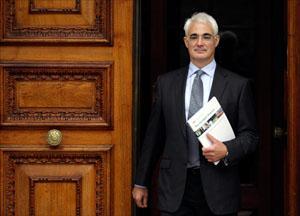Advertisement
UK Slaps Tax On Bankers' Bonuses Ahead Of Election
The British government slapped a one-time tax of 50 percent on fat bank bonuses as it tried to win over voters ahead of a looming general election.
Treasury chief Alistair Darling said the tax, to be levied on 2009 discretionary bonuses of more than 25,000 pounds ($40,800), represented payback time for banks that lost a combined 80 billion pounds last year and needed taxpayer-funded bailouts.

"There are some banks who still believe their priority is to pay substantial bonuses to some already high-paid staff," Darling told lawmakers Wednesday as he delivered the government's pre-budget report in Parliament.
"Their priority should be to rebuild their financial strength and to increase their lending," he added. "If they insist on paying substantial rewards, I am determined to claw money back for the taxpayer."
The tax proposal was clearly aimed at voters, with Prime Minister Gordon Brown's government trailing the opposition Conservative Party in opinion polls ahead of an election that must be held by June — and with Britain in its worst recession since World War II.
Opposition politicians said the bonus tax was political spin that would do little to raise revenue, and the country's banking association said it could damage the country's standing as a financial center. Several economists found little in Darling's report that would spur the economy in the short run - or to cut Britain's spiralling deficit in the long run.
Darling acknowledged that the economy will shrink more this year than he previously predicted. The government also increased its forecasts for borrowing this year and next.
The tax on bankers' bonuses, said Monument Securities strategist Mark Ostwald, was a "totally gratitious" measure that would raise around 550 million pounds ($890 million) - a drop in the bucket of the increased forecast of 178 billion pound government borrowing this year and 176 billion pounds next year.
The tax will be imposed on the pool of bonuses paid by a bank, rather than individual payments and it will be paid by the bank - not the recipient of the bonus.
"Viewed from abroad, London may well look now like a significantly less attractive place to build a business," said British Bankers' Association Chief Executive Angela Knight.
Rod Roman, Financial Services Partner at Ernst & Young, said that the one-off tax could damage future expectations.
"Those investing in the U.K. will have to double guess the actions of future governments and in this situation, low tax rates will no longer attract companies to the U.K.," Roman said.
Paul Kenny, general secretary of the leading GMB union, however, said that taxing bonuses was "long overdue."
"There is a cultural issue here that needs to be addressed and the public will support the government in dealing with it," Kenny said.
Conflicting economic and political pressures made Darling's task of laying out the government's spending, taxation and borrowing plans a highwire act. As expected, with one eye on voters, he steered clear of major tax increases or spending cuts that could address the hole in the government's finances.
"We were promised a pre-budget report, and what we got was a pre-election report," said opposition Treasury spokesman George Osborne. The Conservatives, who have called for quicker action to bring down the deficit, have pledged to rewrite the budget within 50 days if they win the election.
Britain is facing a heavy hangover from the global credit squeeze because of its huge financial sector, and higher levels of personal debt among consumers. It remains the only major economy still officially in recession.
Darling on Wednesday acknowledged that the economy will shrink by 4.75 percent this year, significantly worse that the 3.25-2.75 percent contraction he predicted at the time of the full annual budget in April.
He reiterated his belief that the economy will restart growth by the end of the year and retained his forecast of gross domestic product growth of 1-1.5 percent growth for next year, a prediction that economists have already deemed optimistic.
Darling confirmed that retail sales tax would rise back to 17.5 percent, after a yearlong cut to 15 percent to aid economic growth, on Jan. 1.
But economists said it was clear he was postponing tough decisions to restore fiscal stability until after the election - Chris Sanger, head of tax policy at Ernst & Young, said that higher rates were a certainty going ahead.
Darling also announced a series of other voter-friendly measures, including quicker access to training for unemployed youth, extended waivers on small business taxes and home purchasing duties and breaks on taxes for users of home wind turbines and electric cars.
He defended the spending and taxation plan as necessary to ensure continued growth.
"The choices are between going for growth or putting the recovery at risk," he told lawmakers. The government aims "to reduce the deficit while protecting front-line services or cuts which put these services in danger."
This program aired on December 9, 2009. The audio for this program is not available.